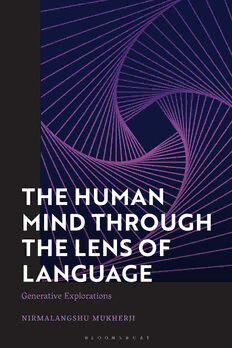
The Human Mind through the Lens of Language: Generative Explorations PDF
Preview The Human Mind through the Lens of Language: Generative Explorations
The Human Mind through the Lens of Language Also available from Bloomsbury Advances in Experimental Philosophy of Language, edited by Jussi Haukioja Certainty in Action, by Danièle Moyal-Sharrock Names and Context, by Dolf Rami The Evolution of Consciousness, by Paula Droege The Philosophy and Science of Predictive Processing, edited by Dina Mendonça, Manuel Curado and Steven S. Gouveia The Human Mind through the Lens of Language Generative Explorations Nirmalangshu Mukherji BLOOMSBURY ACADEMIC Bloomsbury Publishing Plc 50 Bedford Square, London, WC1B 3DP, UK 1385 Broadway, New York, NY 10018, USA 29 Earlsfort Terrace, Dublin 2, Ireland BLOOMSBURY, BLOOMSBURY ACADEMIC and the Diana logo are trademarks of Bloomsbury Publishing Plc First published in Great Britain 2022 Copyright © Nirmalangshu Mukherji, 2022 Nirmalangshu Mukherji has asserted his right under the Copyright, Designs and Patents Act, 1988, to be identified as Author of this work. Cover image © Ajwad Creative / Getty Images All rights reserved. No part of this publication may be reproduced or transmitted in any form or by any means, electronic or mechanical, including photocopying, recording, or any information storage or retrieval system, without prior permission in writing from the publishers. Bloomsbury Publishing Plc does not have any control over, or responsibility for, any third-party websites referred to or in this book. All internet addresses given in this book were correct at the time of going to press. The author and publisher regret any inconvenience caused if addresses have changed or sites have ceased to exist, but can accept no responsibility for any such changes. A catalogue record for this book is available from the British Library. A catalog record for this book is available from the Library of Congress. ISBN: HB: 978-1-3500-6268-9 ePDF: 978-1-3500-6269-6 eBook: 978-1-3500-6270-2 Typeset by Deanta Global Publishing Services, Chennai, India To find out more about our authors and books visit www .bloomsbury .com and sign up for our newsletters. To Mohan vi Contents List of figures ix Preface x Introduction: Setting the stage 1 0.1 Mind and cognition 3 0.2 Cartesianism 6 0.3 Saltation problem 10 Part I The background 1 The Cartesian perspective on the mind 19 1.1 From substances to doctrines 21 1.2 Thought and consciousness 29 1.3 Ascription of thoughts 37 1.4 Mind and super-body 47 2 The mind in cognitive science 51 2.1 Traditional view of the mind 54 2.2 Computationalism 60 2.3 Neuroscientism 67 2.4 The modularity issue 72 Part II The proposal 3 Language as mirror of the mind 83 3.1 The onset of language 84 3.2 Language and thought 91 3.3 Principle G 99 3.4 Boundaries of the mind 103 4 Redesigning Proto 108 4.1 Aspects of language evolution 108 4.2 Two thought experiments 116 4.3 Generative operations 123 4.4 Proto and Principle G 129 viii Contents 5 Merge and linguistic specificity 134 5.1 Principles and parameters 135 5.2 Minimalism 143 5.3 Set Merge 150 5.4 Economy principles 154 6 No Merge for animals 160 6.1 The mind and computation 161 6.2 Insect navigation 168 6.3 Birdsong 173 6.4 Primate cognition 179 7 Merge is (perhaps) all we need 184 7.1 The language bias 184 7.2 Music 191 7.3 Questionable domains: Concepts, morality 200 7.4 Promising domains: Kinship, arts 208 8 Implications 213 8.1 Stone tools and early mind 213 8.2 Mind and core language 219 8.3 MERGE and Principle G 223 8.4 Words and Pair-Merge 226 Notes 233 References 243 Index 263 Figures 3.1 A section of the primate line 86 4.1 Evolution of hominid brain size 112 4.2 Modelling mental powers 115 6.1 Dead reckoning of C. fortis 169
